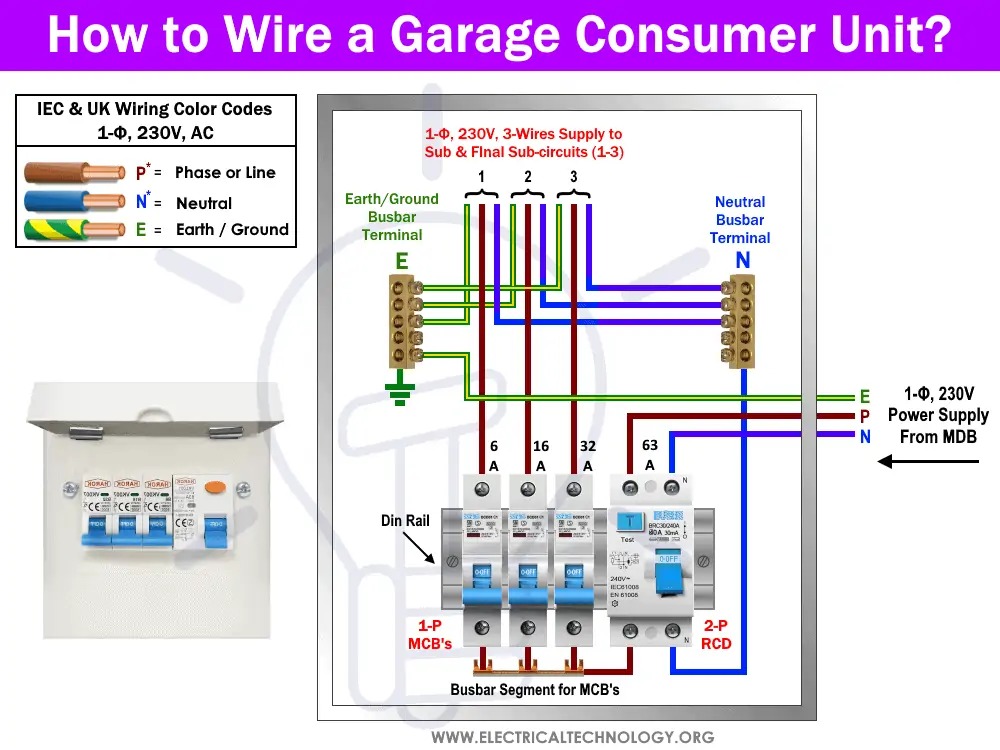
A garage is more than a storage space—it’s a workshop, a charging station for electric vehicles, or even a home gym. Powering these versatile spaces safely requires a robust electrical system anchored by a garage consumer unit. This guide demystifies the process of wiring a consumer unit, connecting load circuits, and navigating IEC & UK wiring color codes to ensure your project meets safety standards and performs flawlessly.

Before handling live components, ensure you have:
A garage consumer unit (preferably with RCD protection).
Appropriate cables (e.g., 2.5mm² twin and earth for radial circuits).
Tools: insulated screwdrivers, wire strippers, a voltage tester.
A garage consumer unit wiring diagram specific to your model.
Safety First: Turn off the main power supply and verify circuits are dead using a voltage tester.
Position the unit near the garage entrance for easy access, avoiding damp areas.
Secure it to a sturdy surface using screws, ensuring it’s level.
Feed the supply cable (from the main house fuse box) into the unit via a gland or knockout.
Strip the cable sheath to expose live (brown), neutral (blue), and earth (green/yellow) wires.
Connect them to the main switch’s terminals:
Live (L): Brown wire to the top terminal.
Neutral (N): Blue wire to the adjacent terminal.
Earth (PE): Green/yellow wire to the earth bar.
Pro Tip: For garage distribution boards with RCDs, ensure the supply cable is rated for the total load.
Slot individual MCBs (Miniature Circuit Breakers) or RCBOs into the DIN rail.
Label each breaker (e.g., "Lighting," "Sockets," "EV Charger").
Double-check connections against your consumer unit wiring diagram.
Restore power and test each circuit with a multimeter.
Learn More: Garage Consumer Units - Ultimate Guide
Load circuits distribute power from the consumer unit to specific zones. Common garage circuits include:
Lighting Circuits (6A MCB): For ceiling lights and outdoor security lamps.
Socket Circuits (16A/20A MCB): For tools, appliances, or EV chargers.
Dedicated Circuits (32A MCB): For high-power devices like welders.
Radial Circuits: A single cable runs from the consumer unit to the last outlet. Ideal for garages due to simplicity. Use 2.5mm² cable for 20A circuits.
Ring Circuits: Rarely used in garages but suitable for large workshops. Requires 2.5mm² cable looped back to the unit.
Run 1.5mm² cable from the 6A MCB to the first light.
Use junction boxes or 2-way consumer unit wiring diagrams for multi-light setups.
Connect live (brown) to the switch, neutral (blue) to the fitting, and earth to the fixture’s terminal.
Caution: Always isolate circuits before working on them.
From a 16A MCB, route 2.5mm² cable to double-pole sockets.
Employ garage consumer unit wiring diagrams to daisy-chain sockets.
Terminate wires securely, ensuring no exposed copper.
For EV Chargers: Use a 32A RCBO and 6mm² cable to handle sustained loads.
Modern consumer units often include a main RCD (Residual Current Device) to prevent electrocution. For garages with damp environments:
Opt for a garage consumer unit with RCD or install a separate RCD upstream.
Test monthly using the built-in “T” button.
Since 2004, the UK follows harmonized EU standards:
Live (L): Brown (pre-2004: red).
Neutral (N): Blue (pre-2004: black).
Earth (PE): Green/Yellow stripes.
Key Exception: In older fuse box wiring, red (live) and black (neutral) may still appear. Label these clearly during upgrades.
The International Electrotechnical Commission mandates:
Live (L): Brown or black.
Neutral (N): Blue.
Earth (PE): Green/Yellow.
Note: While UK wiring color codes align with IEC for new installations, always verify local regulations.
Mixed Color Codes in Renovations: Use sleeving or tape to mark old wires (e.g., wrap black wires with blue tape for neutral).
Incorrect Earthing: Ensure all metal fixtures (e.g., garage fuse boxes) are bonded to the earth bar.
Overloaded Neutrals: In 2-way consumer unit wiring diagrams, avoid sharing neutral wires across phases.
Wiring a garage consumer unit is a blend of precision and practicality. By methodically connecting load circuits, adhering to UK wiring color codes, and integrating RCD protection, you create a system that’s both safe and scalable. Whether you’re installing a shed garage consumer unit or upgrading an old electrical fuse box, this guide equips you with the knowledge to tackle the project confidently.
Remember, electricity forgives no errors. When in doubt, consult a certified electrician—especially for complex tasks like consumer board wiring or garage electrical installations. With the right approach, your garage will transform into a powerhouse of productivity, safeguarded by meticulous planning and compliance.
When investing in electrical protection devices such as Metal Consumer Unit, Metal Garage Unit/EV Charging Unit, make sure that you always get help from a reliable manufacturer/supplier such as laiwo. laiwo electrical is a one-stop solution for all your electrical needs including surge protectors, miniature circuit breaker, rccb , rcbo and main switch disconnector. If you have additional questions or need assistance, please feel free to contact the customer service team. Give us a call and we'll have a team of professionals answer your questions!
INQUIRY NOW